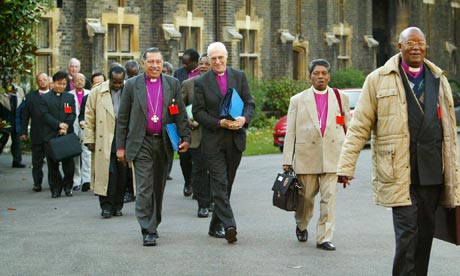A marginal Westerner, a British writer of curious attainments, Andrew Brown of the Guardian, apparently a theological liberal, predicts the end of the Church of England's loss of a posture on sodomitic-marriage. That might be so. Largely, the C o E has lost on the issue of theologial liberalism...although the 1662 BCP and the Thirty-nine Articles remain the law of England. But, back on issue, Andrew isn't God, is he? Nor is the Queen, Prime Minister, or the Episcopal bench. It would not be the first time the Church has lost the battle against the disordered sexualities of the outsider-pagan cultures. One is reminded of the repetitive forays of ancient Israel into the paganized sexualities of Baal and Ashtoreth religions. The Prophets and Law have stood through the centuries although "pagans in the church" were pruned off. As the twilight darkens and the sun sets in England, like the US, there will always be "7000 who have not bowed the kneel to Baal" (Rom. 11.1ff.). Andrew can crow in public, but the Christian rehearses, repeats, and rejoices in the eschatological hope of Mt. 25.31ff, Rev. 22, and the weekly confession of faith, "....and He shall come again to judge the living and the dead." Andrew, your crowing is premature. The elect will survive the decadence and, in fact, will be strengthened for war, battle, writing, speaking and confessing the faith. Prov. 28.4 promises this, to wit, those who forsake the law will praise the wicked while those who keep the law will content with the forsakers and the wicked. If Andy persists in his depravity, his funeral would be a fine occasion for a scholarly, Biblical, Confessional and pastoral sermon on hell and Andy's new status as a new member of hell. Hell's made for those who rejoice against God. Here's Andy.
http://www.guardian.co.uk/commentisfree/andrewbrown/2012/sep/30/church-england-homosexuality-liberals-won
The church's wars over sexuality are coming to an end

What the article makes clear is that, even among conservative evangelicals, it is no longer possible to deal with gay people, and the problems their existence poses, by simple repression.
Coming out was obviously a hugely painful business for him.
"Close family and friends have known for a considerable time that I experience same-sex attraction … In fact, I included some personal references when I first wrote the chapter on homosexuality six years ago, but I removed them before it was published, because we were all conscious of the potential dangers of unhelpful labelling."
I sympathise with anyone who wants to keep their sex life, or lack of it, private. But Roberts appears to realise the truth of the anti-Mafia slogan "Silence is complicity" – in his case, complicity with homophobia. The message of evangelical churches is often that gay people are repulsive and the things they do disgusting.
"We in the church are too often heard to be presenting only a negative message, which can leave them feeling deep shame and discourage them from emerging from the isolation of a lonely and private battle, which creates a fertile soil where temptation increases and compromise becomes more likely."
So, at last, we have an important evangelical figure admitting that conservative evangelicals are repelled by gay people, that homosexuality is not a choice, and that God won't cure it, even if omnipotence means He could: "A small proportion of people, including Christians, find that they remain exclusively attracted to the same sex as they grow into mature adulthood. God has the power to change their orientation, but he hasn't promised to and that has not been my experience."
The vision he sets out of a celibate gay Christian life lacks joie de vivre. In fact, he compares it to depression, alcoholism and blindness. "Those who have not married have embraced the Bible's very positive teaching about singleness as a gift (see 1 Corinthians 7.32-35), whether chosen or not, which, I imagine, alongside loneliness and sexual frustration, has afforded them wonderful opportunities for the loving service of God and others."
It's not really surprising that few Christians find this prospect attractive; silence and suppression were very much safer. But a constant theme in his interview is that it is the sexually relaxed culture around them that is forcing the church towards greater honesty.
Meanwhile, the moderate evangelical grouping Fulcrum, which was formed, really, in order to uphold the prohibition on gay sex but to welcome women priests, carries an article on its website that shows opinion shifting there as well: Matthew Grayshon, the rector of St Mary's Hanwell, in west London, wrote in favour of blessing civil partnerships. One factor in changing his mind had been the fact that one of his churchwardens is in a civil partnership.
Grayshon is still opposed to gay marriage, and ambivalent about gay adoption. Unlike Vaughan Roberts, he is himself straight. But he writes like a man who has had intimate conversation with gay friends (which must, in a way, be much more difficult for celibates still mostly in the closet). He writes:
"It is cruelly unhelpful to suppose that anyone has chosen their sexual orientation. I have had fierce conversations in east Africa, which have used up nearly all my credibility in defending the givenness of sexual orientation."
This last, is I think, the crucial point. Conservative evangelicals in England have dreamed or hoped for 20 years that England could be brought back to a Nigerian or Ugandan view of homosexuality. It's not going to happen, and it's not going to happen within the Church of England, either. That's true whoever becomes archbishop. The sexuality wars are coming to an end, and the liberals have won.
No comments:
Post a Comment